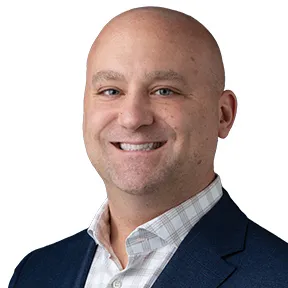As Riveron CFO Tony Ciotti sees it, the lines between financial teams and operations teams are rapidly blurring. In some cases, he says, they’re “just nonexistent.”
Consider the rise of the chief operating and finance officer, or COFO. Salesforce and Qualcomm are among the latest big companies to appoint individuals to this hybrid role. Though Ciotti is not one himself, he predicts it’s a trend that will continue in the years ahead.
Ciotti came into his role as CFO of Riveron after years in operations at firms like PricewaterhouseCoopers and Grant Thornton. He first joined the latter as operations director back in September 2013.
Just about a decade later, he followed Grant Thornton’s former CFO Sam Shaw over to Riveron, where Shaw now serves as chief executive.
In an interview with CFO.com, Ciotti talks through why he believes finance and operations will continue to meld, how he approaches leadership under private equity and what he’s learned from financial crises over the years.
Tony Ciotti

CFO, Riveron
First CFO position: November 2023
Notable previous employers:
- Grant Thornton
- PwC
- Accenture
This conversation has been edited for clarity and brevity.
DAN NIEPOW: You’ve spent a lot of your career so far working in operations roles. What led you to turn to the financial side of things and to becoming a CFO specifically?
TONY CIOTTI: I followed a less-than-traditional path to CFO. But I would also say, candidly, that the definition of a “traditional path” is changing by the day. I see and hear this all the time among my CFO brethren. I am not hearing or seeing the CPA-required, compliance-oriented mindset of the past. We are seeing more and more operators in these roles.
My experience in operations has set me up for success, as much as my experience in finance has. In my mind, it’s all about having the ability to span across different functions in an organization while maintaining a strong financial perspective. And as part of the operations team, I’ve led resource management functions, recruiting functions, marketing, sales, IT functions. It makes me more than just the numbers guy who’s prescribing something to you.
As for Riveron specifically, I was attracted to the company’s mission and team. The firm is full of people who’ve sat in the CFO seat for private equity companies, for portfolio companies, for publicly traded companies and privately held companies. It’s been a great way to dive into my first CFO role.
What do you think finance teams can learn from operations teams?
In today’s companies, there’s so much overlap between finance and ops. I think the lines can essentially be blurred, or, in many cases, nonexistent. As I came up through prior firms, we consistently relied on financial-operator types — people who sat in between the business, supporting day-to-day operations and supporting the finance function. They were squarely in between, straddling that fence.
I’d also say operators, at times, have a broader purview and perspective. It’s a powerful position to consider, particularly when you parlay that with financial literacy. Then you’ve got someone who has done the job that the practice trusts, but that the finance function and accounting function know and trust as well. That’s a great example of where these lines start to blur.
We’re seeing more and more companies appointing COFOs — chief operating and financial officers. Given your history, what’s your take on this trend? Do you expect this to be something we’ll continue to see?
Absolutely, I expect it to continue on steroids. We see this every day with our client base at Riveron. These two roles often go hand in hand or get blended into a single role. We’re also seeing the aperture for CFOs being broadened tremendously. We’re expected to be much more than a cost center or a financial voice of the firm. We have to do more than deliver the financial news.
“In today’s companies, there’s so much overlap between finance and ops. I think the lines can essentially be blurred, or, in many cases, nonexistent.”

Tony Ciotti
CFO, Riveron
In my case, for example, I’m in the boardroom all the time. I’m not just talking about what happened, but also about what will happen and why, and what I’m doing about it. We’ve become strategy enablers. Yes, there’s still the compliance lean to it.
We’re also responsible for driving growth and profitability. And yet, in my world, I’m seeing regulatory, tax compliance and the more traditional focus of the past gradually landing with highly capable controllers and accounting teams. I’ve been fortunate enough to have some rockstar controllers who’ve enabled me to step up and focus on bigger picture things. That’s also enabling many other modern CFOs to focus on strategic priorities in tandem with the CEO and in tandem. And that’s where I see that blended COFO role being very powerful.
Riveron was acquired by private equity firm Kohlberg & Co. about two years ago. Can you talk a bit about what it’s like leading a private equity-owned company?
We were owned by H.I.G. Capital before the Kohlberg deal, so we’re very familiar with private equity. I would say the goals remain the same, regardless of ownership structure: deliver exceptional client service, drive high growth, take market share and scale.
In Kohlberg, we have a financial sponsor who has strong conviction in their investment thesis, and they’ve opened up a lot of growth opportunities for us. Like any portfolio company, we move at a very fast pace. We are aggressive in our pursuit of growth, but we also know when to quickly call the ball and pivot when something isn’t working.
“Use today’s headwinds as a catalyst for change. Maybe that means evaluating opportunities now for the incorporation of things like artificial intelligence or other emerging tech. The truth is, the more you wait, the more behind you’ll be.”

Tony Ciotti
CFO, Riveron
And we still maintain a “think like an owner” mindset. It allows us to drive value in the short and long term. We also serve plenty of private equity clients; we like to say we’re built by PE, for PE. We understand the expectations of sponsors and the needs of portfolio companies. We speak the language.
The announcement about your acquisition noted that a “a significant percentage of Riveron’s employee base will also be equity owners in the company.” Can you talk a bit about that dynamic? Is Riveron still partly employee-owned, then?
It is. It’s a great structure, and a great feather in our cap. We encourage our employees to directly participate in the value creation opportunity under Kohlberg’s hold. Once they reach a certain level, employees have the option to purchase common equity in the firm, subject to investment caps.
Today, hundreds of our 1,200 employees sit on the cap table. They’ve invested their own money in the firm, and their collective equity position in the firm is sizable. I mentioned “thinking like an owner” in response to your last question; there’s no better way to drive employees to think like an owner than to be one. For us, it’s been a hugely motivating differentiator at Riveron. Nearly everyone eligible to participate does.
On your LinkedIn page, you said you have “specific expertise in helping firms ‘survive and thrive’ in times of financial crisis.” What would you say are the most important elements for companies to keep in mind during a financial crisis or downturn?
If you look back at any of the recent crises — whether that’s the Great Recession, COVID-19 or even this current cycle — there are consistent themes that emerge and opportunities that arise. That’s my starting point mentality: Where’s the opportunity in this climate? I try to see today’s uncertainty as tomorrow’s opportunity. Use today’s headwinds as a catalyst for change. Maybe that means evaluating opportunities now for the incorporation of things like artificial intelligence or other emerging tech. The truth is, the more you wait, the more behind you’ll be.
I say that with confidence because these changes are coming, agnostic of whatever the economy looks like in six months or a year. Take the time to sharpen your pencil on things like forecasting, managing P&L and cash flow. You need to understand where precious capital can and should be deployed.
I would advise businesses not to sit on the sidelines. And for those businesses that are challenged with top-line growth or stagnancy, I’d emphasize that you can’t cut your way to prosperity either. Yes, you’ve got to manage profitability. But the challenge is finding creative ways to make investments even during hard times.





![[PODCAST] The future of tax: What’s next for your team?](https://leviroyce.com/wp-content/uploads/2026/03/40168-podcast-the-future-of-tax-whats-next-for-your-team-400x250.webp)